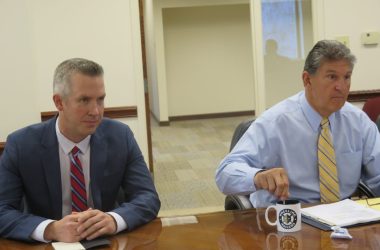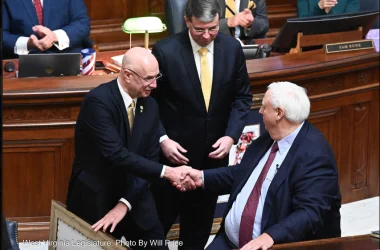By Phil Kabler
For the West Virginia Press Association
CHARLESTON, W.Va. — Gov. Jim Justice’s latest effort to promote his plan to help close a $500 million shortfall in the 2017-18 state budget, in part, by raising about $350 million in new taxes left legislative leaders seeing red – literally.
Declaring that the Legislature’s plan to cut the general revenue budget to $4.05 billion – about $390 million less than the current budget – would cause a health emergency in the state, Justice ordered the lighting of the lantern in the state Capitol dome – a light historically lit during declared states of emergency.
Not only that, but Justice had the light bulbs in the lamp changed from white to a more attention-getting red.
“We are going to let the people know we have a health crisis beyond belief. There are thousands and thousands and thousands that are going to be devastated,” the governor said of the legislative proposal to cut the “big three” items of the state budget – K-12 public education, higher education, and the Department of Health and Human Resources – by about $50 million each.
House Speaker Tim Armstead, R-Kanawha, and Senate President Mitch Carmichael, R-Jackson, denounced the lighting of the Capitol dome lantern as a stunt, and Armstead called it disrespectful to victims of natural disasters, including those hit by flooding in central and southeastern parts of the state last June.
“The people of West Virginia expect better from their governor,” Armstead said. “Bullying isn’t leadership. Building consensus around the right plan for our state is leadership.
“If the governor wants to work with us to solve this problem in a responsible and productive manner, we remain willing to work with him,” Armstead added, “but the clock is ticking, and we don’t have time to play games.”
Carmichael went on to say Justice’s action amounted to declaring war on state taxpayers by demanding that they pay higher taxes.
“The deeds this governor today show a person who is dangerously unprepared to lead this state, and someone who has a deep disrespect for constitutional government and the hardworking, taxpaying citizens who elected him,” he said. “This Legislature will not stand by and allow the taxpayers to be used as collateral, or to be disrespected any longer.”
Late in the week, the House and Senate Finance committees took up versions of the governor’s tax increase bill, but gutted almost everything out of the bills.
The House left the governor’s proposal to raise the state beer tax from $5.50 to $8 a barrel to raise $2.8 million a year, while the Senate retained a portion to shift about $11.7 million a year of tax dollars that now goes to the state Road Fund to the general revenue budget.
Both Finance Committees also advanced bills that would free up $15 million a year of state Lottery profits that go to subsidize racing purses at the state’s two greyhound racetrack casinos.
This is the third straight year the Legislature has attempted to eliminate the greyhound subsidy, which is funded through a percentage of racetrack casino video lottery profits.
In 2014, the Legislature commissioned a study that found the subsidies account for about 95 percent of greyhound racing purses, as live wagering and attendance at the two racetracks has plummeted from the heyday of greyhound racing in the mid-1980s.
Opponents of the legislation say it put people out of work and could cost the state more in unemployment compensation payments than it saves in the racing subsidy.
“We’re going to lose a lot of people. We’re going to lose a lot of jobs, and we’re going to lose a lot of economic impact,” said Steve Sarras, president of the West Virginia Kennel Owners Association.
The legislation sets aside $1 million to promote adoption of greyhounds bred for racing, and to cover costs of placing greyhounds in no-kill animal shelters pending adoption.
Meanwhile, the Senate Judiciary Committee advanced a bill Justice is seeking to reorganize the state Division of Tourism – but with an amendment that would require the administration to sell bonds to build lodges at Cacapon and Beech Fork state parks by Jan. 1.
If the bonds aren’t sold, all state funding for tourism advertising would be cut off until the projects are funded. Justice has advocated for increasing funding for tourism advertising and promotion, saying the current budget is too small to effectively grow state tourism.





